英语基本句子的写法
英语写作中怎样写简单句

英语写作中怎样写简单句中国学生用英语写作文时,会有意无意地用汉语指导整个写作过程。
由于英汉分属不同语系,在语义、语法、语用以及逻辑思维等方面存在较大差别,学生作文中出现许多错误。
而简单句是英语写作中的常用句型。
下面是店铺整理的英语写作中写简单句的方法,欢迎大家阅读!英语写作中怎样写简单句一、简单句的九大基本句型1. “主语 + 谓语”(即“主谓”句型)这一句型英汉语言结构形式完全相同,说明“某人或某物如何动作”,或者说“某人或某物自身怎样运动”。
例:They arrived in Harbin yesterday morning.分析:“他们”(主语)“到了”(谓语动作)。
The earth turns around the sun.地球围绕太阳转。
The sun rises in the east, and sets in the west.太阳东升西落。
2. “主语 + 谓语 + 宾语”(即“主谓宾”句型)这一句型英汉语言的结构形式完全相同,用以说明“某人或某物做什么事情”,或者说“某人或某物发出了动作,并且其动作涉及到另一个人或物”。
例:I study English.分析:“我”(主语)“学习”(谓语动作)“英语”(宾语即动作涉及的对象)。
I like swimming.我喜欢游泳。
3. “主语 + 谓语 + 间接宾语 + 直接宾语”(即“主谓双宾”句型)这一句型英汉语序结构相同,说明“某人为谁(间接宾语为人)做某事”,或者说“某人或物的运动涉及到两个对象,其中一个间接对象为人,另一个为物”。
例:Our teacher taught us English.分析:“我们的老师”(主语)“教”(谓语动作)“我们”(间接宾语)“英语”(直接宾语)。
4. “主语 + 谓语 + 宾语 + 宾语补足语”(即“主谓宾补”句型)这一句型说明“某人或某物要求(使、让)某人做什么”或“某人感觉某人或物怎么样”。
英语句子基本结构15
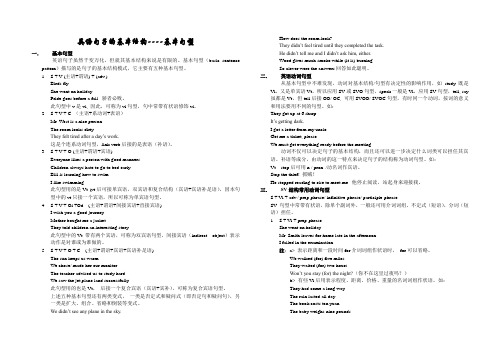
英语句子的基本结构----基本句型一.基本句型英语句子虽然千变万化,但就其基本结构来说是有限的。
基本句型(basic sentence pattern)描写的是句子的基本结构模式,它主要有五种基本句型。
1.S + V (主语+谓语) + (adv.)Birds fly.She went on holiday.Pride goes before a fall. 骄者必败。
此句型中v是vi, 因此,可称为vi句型,句中常带有状语修饰vi。
2.S + V + C (主语+系动词+表语)Mr. West is a nice person.The room looks dirty.They felt tired after a day’s work.这是个连系动词句型,link-verb后接的是表语(补语)。
3.S + V + O (主语+谓语+宾语)Everyone likes a person with good manners.Children always hate to go to bed early.Bill is learning how to swim.I like swimming.此句型用的是Vt (vt后可接单宾语,双宾语和复合结构(宾语+宾语补足语),因本句型中的vt只接一个宾语,所以可称为单宾语句型。
4.S + V + Oi +Od (主语+谓语+间接宾语+直接宾语)I wish you a good journey.Mother bought me a jacket.They told children an interesting story.此句型中的Vt 带有两个宾语,可称为双宾语句型,间接宾语(indirect object)表示动作是对谁或为谁做的。
5.S + V + O + C (主语+谓语+宾语+宾语补足语)The sun keeps us warm.We chose/ made her our monitor.The teacher advised us to study hard.We saw the jet plane land successfully.此句型用的也是Vt,后接一个复合宾语(宾语+宾补),可称为复合宾语句型。
简单句的五种基本类型整理

简单句的五种基本类型整理简单句的五种基本类型简单句:只包含一个主语(或并列主语)和一个谓语(或并列谓语)的句子,称作简单句。
简单句的基本句型:简单句有以下5种基本句型。
1.主语+ 不及物动词例:It is raining heavily.My tooth aches.2.主语+ 及物动词+ 宾语例:They enjoy the play.I met John in the street yesterday.3.主语+ 系动词+ 表语例:He is out.Jenny is fine.It looks like rain, soon.4 主语+ 及物动词+ 双宾语例:He bought her a watch.The sun gives us light.注意:双宾语一个指人(即间接宾语),另一个指物(即直接宾语)。
一般间接宾语位于直接宾语的前面,有时它们也可交换位置,这是需要在间接宾语的前面加上介词to 或for 。
常见的双宾语结构:bring sb. sth (bring sth to sb). give sb. sth (give sth to sb.) hand sb. sth (hand sth to sb.) leave sb. sth (leave sth.to sb) lend sb. sth (lend sth to sb) pass sb sth (pass sth to sb)return sb. sth (return sth to sb) send sb sth (send sth to sb) show sb sth (show sth. to sb.) tell sb sth (tell sth to sb )write sb sth (write sth to sb ) buy sb sth (buy sth for sb )do sb sth (do sth for sb ) get sb sth (get sth for sb )make sb. sth (make sth for sb) pay sb. sth (pay sth for sb)sing sb sth (sing sth for sb )5.主语+ 及物动词+ 宾语+ 补足语例:She found him a very clever student.I make it a rule to get up early in the morning.注意:当宾语意思表达不完整时,需要用不足与补充说明宾语的状态、性质等。
英语句子五大基本结构
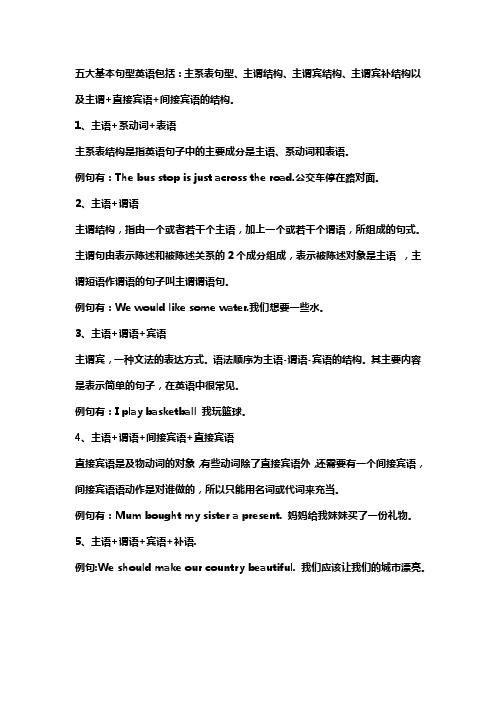
五大基本句型英语包括:主系表句型、主谓结构、主谓宾结构、主谓宾补结构以及主谓+直接宾语+间接宾语的结构。
1、主语+系动词+表语
主系表结构是指英语句子中的主要成分是主语、系动词和表语。
例句有:The bus stop is just across the road.公交车停在路对面。
2、主语+谓语
主谓结构,指由一个或者若干个主语,加上一个或若干个谓语,所组成的句式。
主谓句由表示陈述和被陈述关系的2个成分组成,表示被陈述对象是主语,主谓短语作谓语的句子叫主谓谓语句。
例句有:We would like some water.我们想要一些水。
3、主语+谓语+宾语
主谓宾,一种文法的表达方式。
语法顺序为主语-谓语-宾语的结构。
其主要内容是表示简单的句子,在英语中很常见。
例句有:I play basketball 我玩篮球。
4、主语+谓语+间接宾语+直接宾语
直接宾语是及物动词的对象,有些动词除了直接宾语外,还需要有一个间接宾语,间接宾语语动作是对谁做的,所以只能用名词或代词来充当。
例句有:Mum bought my sister a present. 妈妈给我妹妹买了一份礼物。
5、主语+谓语+宾语+补语.
例句:We should make our country beautiful. 我们应该让我们的城市漂亮。
(完整版)英语简单句的五种基本句型(讲解、练习、打印版)
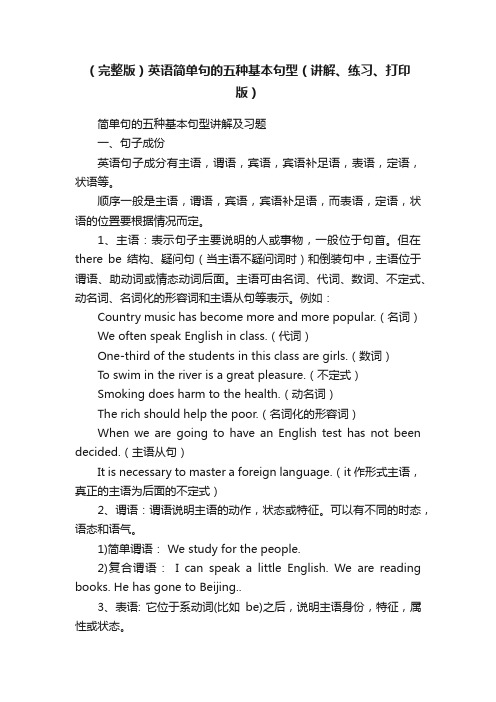
(完整版)英语简单句的五种基本句型(讲解、练习、打印版)简单句的五种基本句型讲解及习题一、句子成份英语句子成分有主语,谓语,宾语,宾语补足语,表语,定语,状语等。
顺序一般是主语,谓语,宾语,宾语补足语,而表语,定语,状语的位置要根据情况而定。
1、主语:表示句子主要说明的人或事物,一般位于句首。
但在there be结构、疑问句(当主语不疑问词时)和倒装句中,主语位于谓语、助动词或情态动词后面。
主语可由名词、代词、数词、不定式、动名词、名词化的形容词和主语从句等表示。
例如:Country music has become more and more popular.(名词)We often speak English in class.(代词)One-third of the students in this class are girls.(数词)To swim in the river is a great pleasure.(不定式)Smoking does harm to the health.(动名词)The rich should help the poor.(名词化的形容词)When we are going to have an English test has not been decided.(主语从句)It is necessary to master a foreign language.(it作形式主语,真正的主语为后面的不定式)2、谓语:谓语说明主语的动作,状态或特征。
可以有不同的时态,语态和语气。
1)简单谓语: We study for the people.2)复合谓语:I can speak a little English. We are reading books. He has gone to Beijing..3、表语: 它位于系动词(比如be)之后,说明主语身份,特征,属性或状态。
英语简单句的五种基本句型

1. 主语 Subject
表示句子说的是“什么人” 或 “什么事”。 通常由名词、代词、主语从句或doing短语等充当。
例如: 1. My teacher hates telling lies. (指老师这个
人) 2. Great changes have taken place in China
3. 主语+不及物动词+副词 构成成语动词 The engine broke down. How did the accident e about? The bomb blew up.
4.主语+不及物动词 有被动意思 Is the book selling well? Does this cloth wash well?
car.
5. 定语 Attributive
常指修饰名词的词或短语。
常由形容词、形容词性物主代词、名词、数词、副词、
介词短语、动词不定式或分词短语等充当。 例如: 1. The black sweater is mine. 2. We have eight classes every day. 3. The coffee cup on the table is mine.
3. 主语+及物动词+不定式 做宾语 We can’t afford to pay such a price. You must try to improve. He forgot which way to go.
4.主语+及物动词+doing(做宾语) Would you mind waiting for a few minutes? I prefer standing. I propose resting for half an hour.
英语简单句的五个基本句型
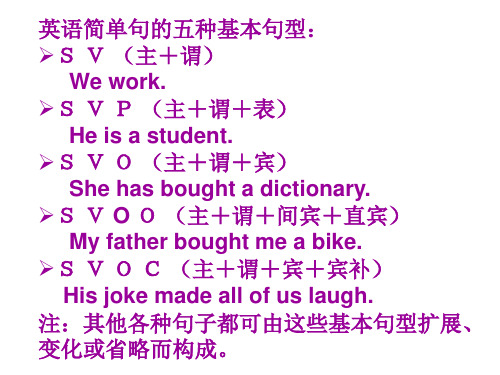
2.主+及物动词+物(直宾)+for+人(间宾)。如: He ordered some food for the two of them.他为他
七)主语+及物动词+动名词(=+to be +过去 分词)
这些花需要浇水。
These flowers need watering =These flowers need to be watered. 这信要求马上回复。
The letter requires answering at once. = The letter requires to be answered at once.
基本句型四:主语+及物动词+间宾+直宾 该句型中的谓语动词必须跟有两个宾语才能表达完整的
意思。一个是表示人的间接宾语;一个表示物的直接 宾语。间接宾语一般在前面,直接宾语在后面。如: Tom left Mary a message.汤姆给玛丽留下了口信。 This will save you much time.这将为您节约大量的 时间。
五)主语+及物动词+动名词(≠+动词不定式) 我永远不会忘记首次见到他的情景。
I will never forget seeing him for the first time.
六) 主语+及物动词+动名词(=+动词不定式) 她喜欢周末看电视。
She prefers watching (to watch) television at weekends.
英语句子的五种基本类型

英语句子的五种基本类型
英语句子的五种基本类型是简单句、并列句、复合
句、复合并列句和复合复合句。
1. 简单句:由一个主语和一个谓语组成,例如:He walks to school every day.(他每天走路去学校。
)
2. 并列句:由两个或多个简单句用连词连接起来,例如:I like to read books, and my brother likes to play video games.(我喜欢读书,我弟弟喜欢玩游戏。
)
3. 复合句:由一个主句和一个或多个从句组成,例如:Although it was raining, we still went to the park.(尽管下雨了,我们还是去了公园。
)
4. 复合并列句:由一个主句和一个或多个并列从句组成,例如:I not only like to read books, but also watch movies and play games.(我不仅喜欢读书,还喜欢看电影和玩游戏。
)
5. 复合复合句:由一个主句和一个或多个从句和一个或多个并列从句组成,例如:Although it was raining, and my brother had to work, we still went to the park and had a great time.(虽然下雨了,而且我弟弟还要工作,我们还是去了
公园,玩得很开心。
)。
英语简单句的五种基本句型
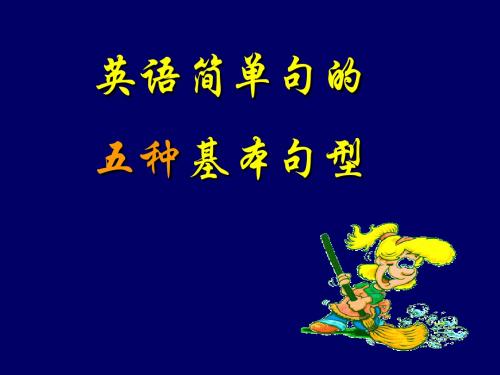
to
take, give, teach, bring, lend, mail, offer, pass, hand, sell, send, show, throw, answer, award, write, grant, permit, promise, pay
for
do, buy, cook, choose, fetch, get, leave, make, order, paint, play(演奏), save, sing,
练习
1鸟在飞翔。 Birds are flying. 2她的宝宝在哭。 Her baby is crying. 3太阳正在落山。 The sun is setting. 4谁也没笑。 No one laughed.
练习2 5你唱得很美。 You sing beautifully. 6 我咳了一夜。 I coughed all night. 7 我们很少在外边吃饭。 We seldom dine out. 8 昨天发生了事故。 The accident occurred yesterday.
• 常用的带双宾语的动词
常跟双宾语的动词
• give, offer, teach, tell, read, ask, bring, pass, lend, return, write, throw, allow, send,cost • make, buy, do, get, save, cook, sing, find 等。
• 常用的带复合宾语的动词 • think, consider, feel, find, have, see, hear, notice, get, leave, ask, tell,etc.
主语+及物动词+宾语+宾语补足语
简单句的五种基本句型

简单句的五种基本句型简单句的五种基本句型1.定义:如果句子只有一个主语或者并列主语和一个谓语或并列谓语动词,这样的句子称为简单句。
2.基本结构共有5种,分别是:(1). 主语+谓语(不及物动词) [S + V]如:The children are playing happily.孩子们正在高兴地玩。
(2). 主语+谓语(及物动词)+宾语[S+V+O]如:The Greens enjoy living in China.-格林一家喜欢住在中国。
(3). 主语+谓语+表语[S+V+P]该句型谓语动词为连系动词。
常见的系动词有:be(是);get(变得), become(成为), turn(变得), look(看起来), feel(感到), smell(闻起来), taste(尝起来), sound(听起来), seem(似乎) 等。
如:①He became a famous doctor.他成为了一名著名的医生。
②The apple pie tastes really delicious.苹果派吃起来真是好吃。
(4). 主语+谓语+间接宾语+直接宾语[S+V+InO+DO]这种句型中的及物动词后跟双宾语,既指人的间接宾语和指物的直接宾语。
也可以把间接宾语放在直接宾语之后,但要加介词for或to。
如:①My aunt bought me a computer. = My aunt bought a computer for me. 我阿姨买给我一台电脑。
②I passed him the salt. = I passed the salt to him.我把盐递给他。
(5). 主语+谓语+宾语+宾语补足语[S+V+O+OC]如:We must keep our school clean.我们必须保持教室清洁。
3.重点难点解析(1).主系表在主系表结构中,只能作表语的形容词,常见的有:alone,asleep,afraid,alive,ill 等。
英语基本句子语法
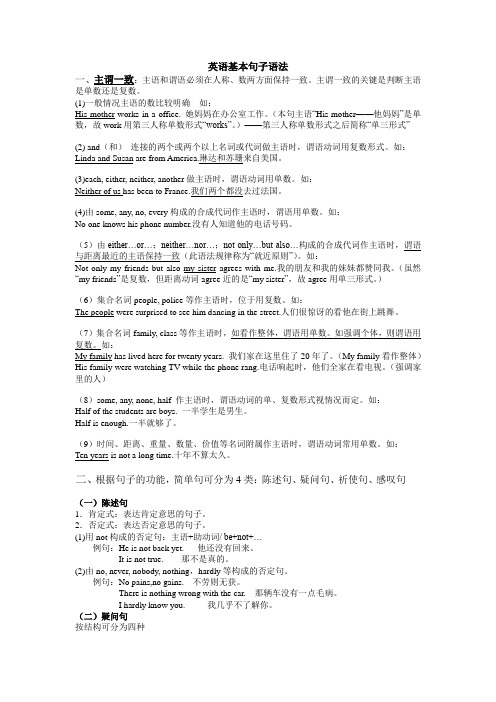
英语基本句子语法一、主谓一致:主语和谓语必须在人称、数两方面保持一致。
主谓一致的关键是判断主语是单数还是复数。
(1)一般情况主语的数比较明确如:His mother works in a office. 她妈妈在办公室工作。
(本句主语“His mother——他妈妈”是单数,故work用第三人称单数形式“works”。
)——第三人称单数形式之后简称“单三形式”(2) and(和)连接的两个或两个以上名词或代词做主语时,谓语动词用复数形式。
如:Linda and Susan are from America.琳达和苏珊来自美国。
(3)each, either, neither, another做主语时,谓语动词用单数。
如:Neither of us has been to France.我们两个都没去过法国。
(4)由some, any, no, every构成的合成代词作主语时,谓语用单数。
如:No one knows his phone number.没有人知道他的电话号码。
(5)由either…or…;neither…nor…;not only…but also…构成的合成代词作主语时,谓语与距离最近的主语保持一致(此语法规律称为“就近原则”)。
如:Not only my friends but also my sister agrees with me.我的朋友和我的妹妹都赞同我。
(虽然“my friends”是复数,但距离动词agree近的是“my sister”,故agree用单三形式。
)(6)集合名词people, police等作主语时,位于用复数。
如:The people were surprised to see him dancing in the street.人们很惊讶的看他在街上跳舞。
(7)集合名词family, class等作主语时,如看作整体,谓语用单数。
如强调个体,则谓语用复数。
英语中的五种基本句型

consider(认为), describe, declare(宣称), etc.
什么动词需要接宾语补足语?
1. 感官动词和使役动词,如: see, hear, notice, watch, hear, feel, observe(感官动词) make, have, let, get(使役动词)
2. 在表示心理状态的动词后作宾语补足语。 这类动词有:consider, think, believe, discover, find, imagine, judge, suppose, prove等。这类动词后的不定式通常是"to be+ 形容词或名词"结构,think, consider, find后的to be常可省略。
4.主+谓+间宾+直宾
She passed him a new dress. He bought her nothing. I told him that the bus was late. He showed him how to use the video.
5.主+谓+宾+宾补
They found the house dirty.
如:He became mad after that. 4.状态系动词:keep, remain, stay;
如:This matter remains a mystery.
3:主+谓+宾
They ate cakes.
He said "Good morning."
I
want to have a cup of tea.
6.Many animals live in trees. 主+谓
练习二:翻译下列句子并,写出是五种句型结构中的哪一种。
英语基本句子的写法

英语根本句子的写法第一步:如何写好根本句子 1. 六种根本句型1)主语+谓语(+状语)(主语+动词(+副词、介词短语等)) I am speaking.He walks very fast.The sun rises in the east and sets in the west.Here es the bus. (此句主谓倒装了)There goes the bugle. (此句主谓倒装了)2)主语+谓语+宾语(主语+及物动词+宾语(名词、代词、数词等)) I study English.She looks after him.He takes good care of his mother.Can you make sure of it?Since I am in charge of the project I must be responsible for the quality of it.We got three a moment ago.She likes reading books after class.I don't like to read that book right now.3) 主语+谓语+间接宾语+直接宾语He gave me a book yesterday.He gave a book to me yesterday.She will buy me a new bike.She will buy a new bike for me.4) 主语+谓语+宾语+宾语补足语(名词、形容词、介词短语、非谓语动词短语等) We call him John.They find the task difficult.She regards me as her brother.She noticed him go out a moment ago.We heard her singing a Russian song just now.What has made China what she is today?5) 主语+系动词+表语(名词、数词、形容词、副词、介词短语等)She is a student.He is twenty.We are strong.Here is your change. (此句主表倒装了)The book is on the table.To master a foreign language is of great importance in China. Keep still or I’ll shoot.He stayed alive after being covered by a pile of broken stones for three days.The cloth feels smooth.其它由行为动词转变而来的连系动词还有:get, stay, look, appear, seem, sound, keep, turn,smell, taste, feel, remain 等。
英语中的五种基本句型

2.主+谓(vi):
句子的谓语动词都能表达完整的意思。
谓(vi) flies. cooked. eat, and drink. talked for half an hour. walked yesterday . is playing.
主 1. Time 2. The man 3. We all 4. They
For example, one evening when it was so warm, I stayed awake on purpose until half past eleven in order to have a good look at the moon by myself. I am only able to look at nature through dirty curtains hanging before very fusty windows.
练习:指出下列句子是什么句型? 1.They work hard. 主 + 谓 2.The flower is dead. 主+系+表 3.Plants need water. 主+谓+宾 4.He gives me some seeds. 主 + 谓 + 直宾 + 简宾 5.We should keep the plants in the shade. 主 + 谓 + 宾 + 宾补 6.Many animals live in trees. 主 + 谓
5. He 6. He
3:主+谓+宾
• • •
They ate He I
cakes.
said "Good morning." want to have a cup of tea.
英语的五种基本句子类型
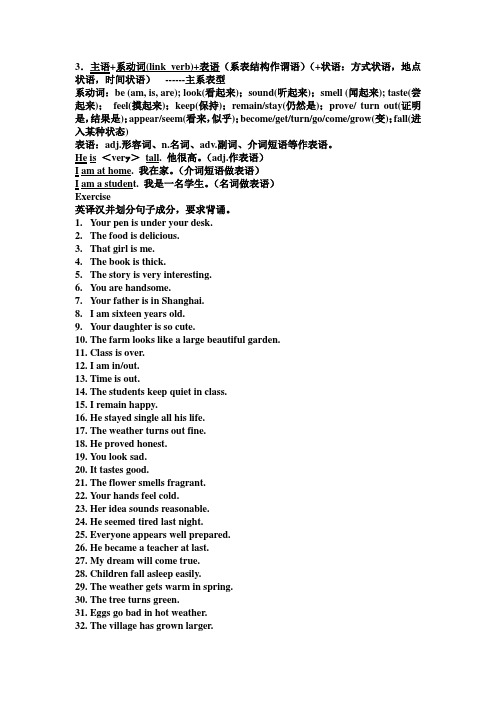
3.主语+系动词(link verb)+表语(系表结构作谓语)(+状语:方式状语,地点------主系表型系动词:be (am, is, are); look(看起来);sound(听起来);smell (闻起来); taste(尝起来);feel(摸起来);keep(保持);remain/stay(仍然是);prove/ turn out(证明是,结果是);appear/seem(看来,似乎);become/get/turn/go/come/grow(变);fall(进入某种状态)表语:adj.形容词、n.名词、adv.副词、介词短语等作表语。
He is<ver y>tall. 他很高。
(adj.作表语)I am at home. 我在家。
(介词短语做表语)I am a student. 我是一名学生。
(名词做表语)Exercise英译汉并划分句子成分,要求背诵。
1.Your pen is under your desk.2.The food is delicious.3.That girl is me.4.The book is thick.5.The story is very interesting.6.You are handsome.7.Your father is in Shanghai.8.I am sixteen years old.9.Your daughter is so cute.10.The farm looks like a large beautiful garden.11.Class is over.12.I am in/out.13.Time is out.14.The students keep quiet in class.15.I remain happy.16.He stayed single all his life.17.The weather turns out fine.18.He proved honest.19.You look sad.20.It tastes good.21.The flower smells fragrant.22.Your hands feel cold.23.Her idea sounds reasonable.24.He seemed tired last night.25.Everyone appears well prepared.26.He became a teacher at last.27.My dream will come true.28.Children fall asleep easily.29.The weather gets warm in spring.30.The tree turns green.31.Eggs go bad in hot weather.32.The village has grown larger.。
英文句子的书写及构成

英文句子的书写及构成9.英语句子的书写句子开头的第一个单词的第一个字母要大写,单词与单词之间要有适当的距离,一般为放入一个字母的空隙,句末要有标点符号,英语的句号是个实心圆点,而不是汉语中的小圆圈。
10.大写字母的用法1)英语句子开头的第一个字母必须大写。
2)I(我),OK在句中任何位置都大写。
3)人名、地名、国名、某国人或某种语言等专有名词的第一个字母必须大写。
4)电影名、书名、报刊、文章的标题等中的每个实词(如:名词、动词、形容词、副词、数词)的第一个字母一般大写。
English Weekly《英语周报》Titanic《泰坦尼克号》5)表示月份、星期、重要节日的名词的第一个字母必须大写。
6)某些缩略词的第一个字母都必须大写。
7)表示称呼的名词的第一个字母通常要大写。
Uncle Wang王叔叔11.词类词类英语名称意义例词名词Noun (n.) 表示人或事物的名称boy, pencil, book, backpack 冠词Article (art.) 用在名词前帮助说明名词所指的人或事物a (an), the代词Pronoun (pron.)用来代替名词以及起名词作用的短语、分句或句子等we, that, his, what 形容词Adjective (adj.) 用以修饰名词,表示人或事物的特征old, red, fine, good 数词Numeral (num) 表示数量或顺序one, thirteen, first, ninth 动词Verb (v.) 表示动作或状态look, go, be(am, is, are) 副词Adverb (adv.) 修饰动词、形容词或其他副词not, too, here, often 介词Preposition (prep.) 表示名词、代词等和句中其他词的关系in, on, of, to, under 连词Conjunction (conj.) 用来连接词与词、短语与短语或句与句and, or, but 感叹词Interjection (interj.) 表示说话时的喜悦、惊讶等情感oh, hello, hi12. 英语句子成分:组成句子的各个部分即句子成分。
- 1、下载文档前请自行甄别文档内容的完整性,平台不提供额外的编辑、内容补充、找答案等附加服务。
- 2、"仅部分预览"的文档,不可在线预览部分如存在完整性等问题,可反馈申请退款(可完整预览的文档不适用该条件!)。
- 3、如文档侵犯您的权益,请联系客服反馈,我们会尽快为您处理(人工客服工作时间:9:00-18:30)。
第一步:如何写好基本句子1. 六种基本句型1)主语+谓语(+状语)(主语+动词(+副词、介词短语等))I am speaking.He walks very fast.The sun rises in the east and sets in the west.Here comes the bus. (此句主谓倒装了)There goes the bugle. (此句主谓倒装了)2)主语+谓语+宾语(主语+及物动词+宾语(名词、代词、数词等))I study English.She looks after him.He takes good care of his mother. Can you make sure of it?Since I am in charge of the project I must be responsible for the quality of it.We got three a moment ago.She likes reading books after class.I don't like to read that book right now.3) 主语+谓语+间接宾语+直接宾语He gave me a book yesterday.He gave a book to me yesterday. She will buy me a new bike.She will buy a new bike for me.4) 主语+谓语+宾语+宾语补足语(名词、形容词、介词短语、非谓语动词短语等)We call him John.They find the task difficult.She regards me as her brother.She noticed him go out a moment ago.We heard her singing a Russian song just now.What has made China what she is today?5) 主语+系动词+表语(名词、数词、形容词、副词、介词短语等)She is a student.He is twenty.We are strong.Here is your change. (此句主表倒装了)The book is on the table.To master a foreign language is of great importance in China.Keep still or I’ll shoot.He stayed alive after being covered by a pile of broken stones for three days.The cloth feels smooth.其它由行为动词转变而来的连系动词还有:get, stay, look, appear, seem, sound, keep, turn,smell, taste, feel, remain等。
6)There be +主语(+状语)There is only one desk in the classroom.There are many students on the playground.There being nothing urgent to do in the office this morning, we did not go to work and stayed at home.2. 句子的四种类型1)简单句John loves Mary.John loves Mary and gives her money.Both John and Cliff love Mary. John and Cliff love Mary and her sister (and give them money).一个简单句可表示:A.a statement (陈述)Mr. Brown teaches this class.B. a question(问题)Do you understand me?C. a command or a request(命令) Open the door.Please help me with my work.D. an exclamation(感叹)How cold it is!What a nice day it is!2) 并列复合句John loves Mary, but she doesn’t love him.Finally John persuaded Mary to marry him for he is a charming persistent young man.The wind is blowing; the light flashing; the thunder roaring; the rain pouring down; the earth rocking. 并列复合句常用连词有:A.表示并列关系的连词有:and ; not only…..but also; furthermore;besides; likewise; moreover;again;I like English and he likes French.Not only the fur coat is soft, but itis also warm.The car was almost new;furthermore it was in excellentcondition.B.表示转折关系的连词:but; yet;still; however; nevertheless; inspite of ; despite; notwithstanding;despite thatThe coat was thin but it waswarm.The car was quite old; yet it wasin excellent condition.In spite of its age, the car was inexcellent condition.The car was quite old; despite thatit was in excellent condition.C. 表示选择关系的连词:or; neither; neither….norYou must work harder, or you will lose the exam.Either your answer or mine is wrong.Your answer is not right, neither is mine.Neither you nor I am to blame. D. 表示因果关系的连词:so; then; therefore; so; consequently; accordinglyThe rain began to fall, so we went home.We worked until six; then we went home.He broke the rules of the school; therefore he had to leave.3)主从复合句We must do what we must do. (宾语从句)What must be done must be done. (主语从句)This is why we must do it.(表语从句)What is done cannot be undone.(主语从句)We can eat what we cannot. (宾语从句)Although John loves Mary, she does not love him. (状语从句)The man whom you met yesterday is a friend of mine.(定语从句)The way that food is cooked and served may greatly affects the appetite of children.No matter what happens \ Whatever happens, my heart will go on and on.(状语从句)4)并列主从复合句When heavy rain comes, the streams rise, and farmers know that there will be floods.The neighborhood that Henry grew up in was fairly prosperous, but it was by no means wealthy.3. 写句子时常见错误1)不定式、动名词、分词、形容词短语悬垂incorrect correctTo learn English well, much practice is necessary.To learn …., we need much practice. Heated, we can make water intosteam. Heated, water can be made into steam.After reading the letter, my heart was beating fast.After reading ..., I found my heart beating fast.Having graduated from middle school, my parents sent me to study abroad. Having graduated from middle school, I was sent to study abroad.Afraid to eat any more seafood, the waiter removed the dish from the table.Afraid to eat..., he asked the waiter to remove the dish from the table.All flights having been called off, we had to go home by train.With all flights called off, we had to go home by train.The Party leading us, the Red Army won one victory after another.With the Party leading us, the Red Army won one victory after another.2) 修饰语错位The newsboy walked his bicycle to the house of his first customer burdened with newspaper. Burdened with newspaper, the newsboy walked to the house of his first customer.The U.S. only has a history of 200-odd years.The U.S. has a history of only 200-odd years.Alice could see a lot of cars running Though her window Alice could see …fast outside through her window.He gave the rose to the lovely actress He gave the rose that he had bought for his wife that he had bought for his wife. to the lovely actress. 3) 代词指代混乱Before Cathy gave the dog its food, Cathy washed the dog before she gave it its food.she washed itJack was bitten by a dog, but it was …, but the bite was not serious.not serious.In Mary’s letter she tried to persuade In her letter, Mary …us to give up the plan.Mike told his father that his car wouldn’t Mike said to his father, “Your car won’t start.”start.4). 混乱转换Every student is required to bring their books Every students is … his books…to the classroom.She left the classroom when the test is over. She left… when the test was over.First, build a fire and then you should make the …, and then make the coffee.coffee.5). 不完整句He had a need and an interest in learning a He had a need for and an interest in…second foreign language.Suzhou in nearer to Shanghai than Nanjing. Suzhou is nearer to Shanghai than Nanjing is.4. 写简洁的句子句子不简洁,应将划线部分删去In my opinion, I think your plan is feasible.My brother accompanied me to go to the airport.Learning a foreign language is important to us who are students.We find the situation that exists at the moment is urgent.In the course of an hour we arrived at our destination.As far as I am concerned, this plan is perfect.It goes without saying that they certainly deserve the prize.5. 变换句式He picked up the ball quickly. Quickly he picked up the …He was young and short and could not join He was too young and to short to join the army.the army.Thomas was tired of studying, so he took Tired of studying, Thomas…a rest.Tolstoy, completing Anna Karenina, won Completing Anna Karenina, Tolstoy won…the national recognition in Russia. 6. 破句He decided to learn Japanese. He decided to learn…because it is…Because it is a useful language.The group travelled for a week. The group travelled…and finally arrived on…Finally arriving on Saturday.One of the century’s great …peni cillin, a miracle…Medical invention is penicillin. A miracledrug that has saved millions of lives.7. 溶合句She wrote him a love letter he answered She wrote…and he answered her in person.her in person.The belt was too small for him she had The belt was so small for him that she had…to change it for another one.Why do you ask how does it concern you? Why do you ask how it concerns you?I didn’t want to talk to my brother I pretended I didn’t want…so I pretended to be asleep.to be asleep.8. 句子成份不平衡Simon is healthy, wealthy and an athlete. Simon is … and athletic.Paul works not only to compete but he also …compete by but also to win a medal.wants to win a medal.I don’t know which I enjoy more, to play …enjoy more, playing tennis or swimming.tennis or swimming.My mother shows her love by cooking and …. show her love by cooking for andserving the family serving the family.ExercisesExercises 1Revise the following sentences.1.To hear him talk, he was thoughtto be a millionaire.2.Reading a novel, the door bellrang.3.She stared at the people nearbywith angry eyes.4.While walking along the street,the high buildings looked shiny and magnificent.5.To win business, many risks mustbe taken.6.As an only son, his parents are tooindulgent to him.7.He has only a face that a mothercould love.8.John Smith who is a neighbor ofmine will go with us.9.The students do morning exercisesevery day to keep fit.10.The result being that he won thegame.11.My new car is a pleasure to drivethere isn’t the slightest squeak or rattle.12.The villagers speak little Englishthe visitors seldom know any their language.13.Selecting Hyde Park Corner as astarting place, our route goes along Knightsbridge.14.Stepping carelessly off thepavement, the bus knocked him down.15.Climbing to the top of the tower,there is a magnificent view to be seen.16.Being Sunday, I shall have a quietday at home.17.If you learn how to take notes inclass, much extra work will be avoided.18.First mix some flour with a littlewater and then you put in some sugar.19.I saw more of him than Richard.20.The policeman’s warning wasaccepted by her.21.I woke up at six a.m. thismorning.22.She looked as though she wasangry.23.Although Tom arrived latehowever he was not criticized by the teacher because he had a bad headache.24.Because he asked me to go, so Iwent.25.Already worn out by illness, thebad news killed him.26.Driving a car on frozen roads thebrakes should be applied gently.27.Learning English, thepronunciation always caused me most trouble.28.One of the young men shoutedsomething in German.waving his hand in the air.29.He told me a secret. That he hadbought her a ring.30.Tom told his brother that he wasin trouble.Exercise 2Fill in the blanks with appropriate connectives.1._____it had stopped raining, weleft the railway station.2.Celia arranged the meeting, and,_____ she considered the terms unfair, she signed the contract. 3.At the age of seventy, the old manreturned to his native town _____ he was brought up.4.I don’t agree with you, _____ doesmy partner.5.I am going out for a short time,______ you can get supper ready.6.Find out _____ they are going thisevening _____ ask _______we may join them.7._____i do not like him very much,I can appreciate his qualities.8.He was very seriously ill; ______doctors have almost given up hope of his recovery.9.Those ______ are not prepared tostudy should _____ change their ways ______ make room for those ______ will work.10.They go to concerts of pop music_____ they really like it.11.She can’t hope to pass the exam inDecember, _____ she’ll have towait till June.12.He broke the rules of the school;_____ he had to leave.13.I don’t know anything against theman; _____ I don’t trust him. 14.I’ll buy a new suit when I get thecheck for the work I did; _____, I’m afraid this old one will have to do a bit longer.15.He’ll never be a good violinist;_____, the professor told him so.16.He doesn’t work hard; _____ he’sincapable of hard work.17.You’ll recognize him ______ yousee him.18.______ is your answer wrong______ mine is ______.19.The nearest town is 5 or 10 milesfrom _____ they live.20.You must work harder; ______you will be put into another class. 附注:主语一般由以下词类担任:名词、数词、代词、动词不定式、动名词、名词性从句、the+某些形容词;The farmer works hard.Three of us went there yesterday. She teaches English.To serve the people is my pleasure. Crying over the spilt milk is no use. What he said at the meeting is important.The poor are living a bitter life.谓语由动词担任。
